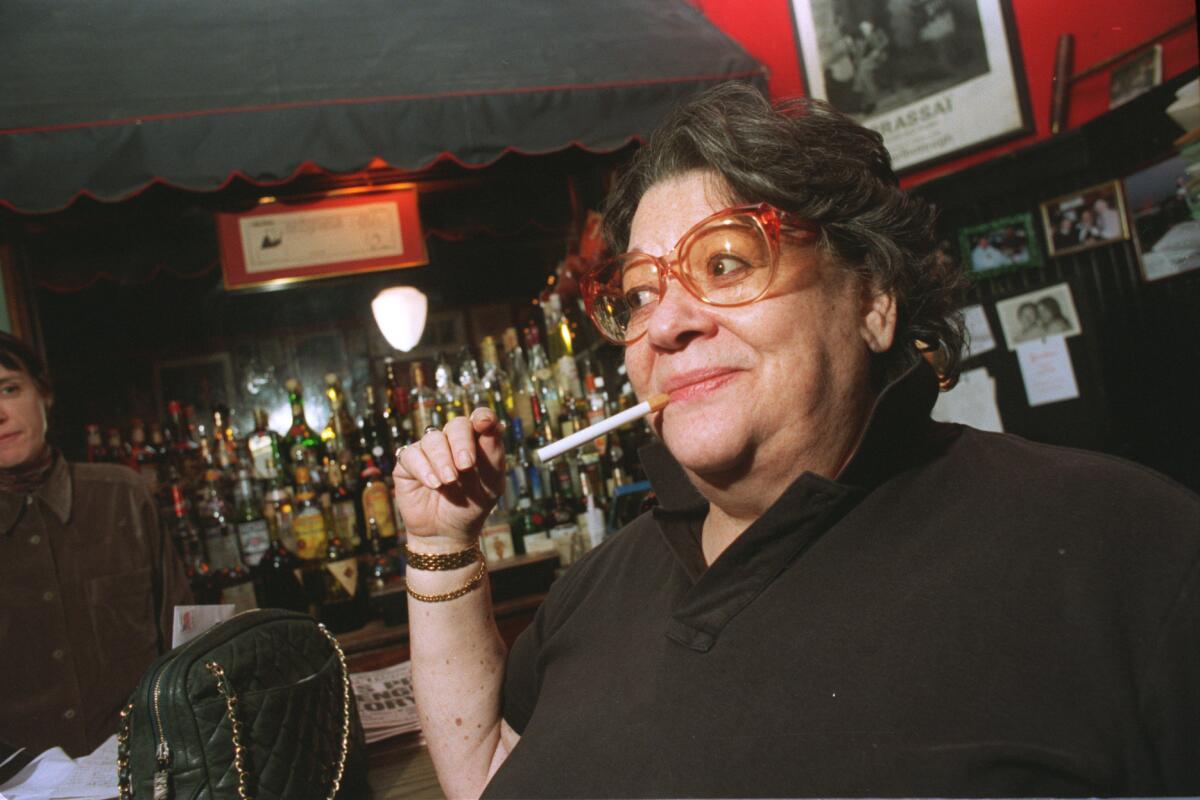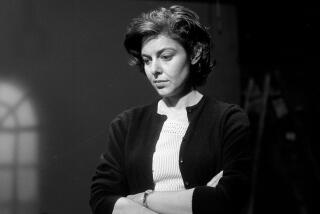Elaine Kaufman dies at 81; legendary proprietor of Manhattan writer’s haunt

Reporting from New York — Bill Bratton insists the steak tips on garlic toast weren’t bad. But that’s not to say he went to Elaine’s on Manhattan’s Upper East Side for the food.
No one did.
Elaine’s was a scene, a clubhouse, an escape from the loneliness of the New York night for writers, cops, politicians and superstars of stage, screen and sports.
Only on the surface was Elaine Kaufman’s creation a bistro.
Kaufman died Friday at 81 in a Manhattan hospital, having run Elaine’s since 1963.
Because she was one of the boys, she was — like many of the writers who spent their evenings with her — a smoker. Almost inevitably, it was emphysema that killed her.
Her voice was a New York legend, a blend of put-on toughness and Bronx nasality that was reduced to a whisper in recent years as her health was failing.
“She was a tough broad,” said Bratton, who ran the New York Police Department and made Elaine’s his watering hole before serving as Los Angeles police chief.
“But she had two soft spots,” he added, “for the Yankees and the writers.”
Yankee owner George Steinbrenner, who died in July, was a friend, and along with her colorful muumuu dresses, Kaufman always wore a World Series ring that he apparently gave her.
If the 21 Club catered to the rich swells, Elaine’s coddled the writers of New Journalism, including Gay Talese, Pete Hamill, Norman Mailer, Nick Pileggi, Nora Ephron and George Plimpton.
Steve Kroft, a CBS News correspondent on “ 60 Minutes,” said that before he moved to New York from Miami, he read an Esquire magazine article about Elaine’s describing the best tables and the atmosphere. There was a sketch of the dining room with Woody Allen at his regular spot. Shortly after Kroft moved to New York, he found Elaine’s.
“There was always a collection of crazy people there, oftentimes a rogue element,” Kroft said. “But you never knew who was going to walk through the front door on any given night at any given time. The reason I always had such a good time, though, was because of Elaine. She made a point of introducing you to people. I always left with a couple of story ideas and business cards, and woke up the next morning with a hangover and indigestion.”
She could also be punishing if regulars stayed away too long — denying them their tables for a couple of nights.
But by all accounts, Kaufman took a cue from Humphrey Bogart’s Rick in “Casablanca,” all tough exterior and surface bravado, but underneath a softie who was fanatically loyal to those who were fanatically loyal to her.
She sat with her patrons, gossiping, circulating among a row of tables against the north wall, ordering food for people even if they weren’t hungry just to keep the kitchen busy, inserting herself in their lives, passing judgment on their dates, even acting as her own bouncer.
Christopher Cerf, a writer who is the son of the late publisher Bennett Cerf, became a regular at Elaine’s shortly after it opened and said Kaufman always watched out for him.
“If Elaine thought there was somebody I should meet she’d say, ‘Chrissy, there is a person here who works for the London Times and I think you should write for them.’ She was very motherly. If she didn’t like somebody I was dating, she’d let me know that.”
Cerf’s friend Paige Peterson, another writer and an illustrator, pointed out that not everybody was accepted into Kaufman’s inner circle — and few women made the cut — but once you were, it was a blessing. Several years ago when Peterson was diagnosed with a brain tumor, she went to Elaine’s the night before her operation and Kaufman and all the waiters circled her table singing “For She’s a Jolly Good Fellow.” When Peterson returned home from the hospital, Kaufman sent over three jars of chicken soup and called demanding she come by. “I had 46 staples in my head, but I was so intimidated by her ‘get-over-here’ command, that night I put on a hat and showed up.” Pausing, Peterson added with a catch in her voice: “She created a home for people … you just felt loved.”
Born Feb. 10, 1929, and raised in the city, the daughter of Russian immigrants, Kaufman fell into the business when she fell in love with Alfredo Viazzi, a restaurateur and writer with whom she ran a Greenwich Village establishment in the 1950s and early ‘60s. The love affair with Viazzi ended, but she stuck with the business. She opened Elaine’s on her own and for more than four decades maintained a tireless schedule of overseeing the dining room and, until she was hospitalized a few weeks ago, remaining until the last patron left for the night.
In 2004, Kaufman was named a New York “Living Landmark” by the New York Landmarks Conservancy. That same year her Runyonesque story was chronicled by A.E. Hotchner in “Everybody Comes to Elaine’s.” She appeared as herself in a number of films, and the restaurant was featured prominently in the opening scene of Woody Allen’s classic film “Manhattan.” She even makes a cameo appearance in the just-released “Morning Glory,” starring Diane Keaton, Harrison Ford and Rachel McAdams.
In any other setting, Kaufman, who had no immediate survivors, would have been the fat girl, the spinster, never asked to dance, always on the sidelines of life. But by creating a clubhouse for celebrities, she became one herself. Her admirers say she had great intelligence and huge courage — and wit she never thought to restrain. And look how it worked out: Vincent Sardi, Toots Shor — and Elaine Kaufman: the holy trinity of saloon proprietors.
Years ago Kaufman told the New Yorker that she left Pete Hamill, her pal, instructions about her funeral: “I said I wanted to be cooked — uh, cremated. And no ceremony. I’d just rather leave an endowed chair of literature at Columbia. For writers.”
Asked if Elaine’s would be open Friday night, just hours after her death, restaurant representative Cindy Carway, as if speaking of a long-running Broadway show, said: “Oh definitely. It will go on.”
Times staff writer Tina Susman contributed to this report.
More to Read
Start your day right
Sign up for Essential California for the L.A. Times biggest news, features and recommendations in your inbox six days a week.
You may occasionally receive promotional content from the Los Angeles Times.






